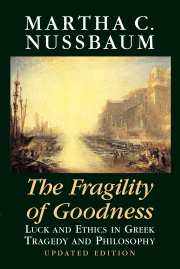Book contents
- Frontmatter
- Contents
- Preface to the revised edition
- Preface
- Acknowledgements
- Abbreviations
- Chapter 1 Luck and ethics
- Part I Tragedy: fragility and ambition
- Part II Plato: goodness without fragility?
- Introduction
- Chapter 4 The Protagoras: a science of practical reasoning
- Interlude 1 Plato's anti-tragic theater
- Chapter 5 The Republic: true value and the standpoint of perfection
- Chapter 6 The speech of Alcibiades: a reading of the Symposium
- Chapter 7 ‘This story isn't true’: madness, reason, and recantation in the Phaedrus
- Part III Aristotle: the fragility of the good human life
- Notes
- Bibliography
- General index
- Index of passages
Chapter 7 - ‘This story isn't true’: madness, reason, and recantation in the Phaedrus
Published online by Cambridge University Press: 05 June 2013
- Frontmatter
- Contents
- Preface to the revised edition
- Preface
- Acknowledgements
- Abbreviations
- Chapter 1 Luck and ethics
- Part I Tragedy: fragility and ambition
- Part II Plato: goodness without fragility?
- Introduction
- Chapter 4 The Protagoras: a science of practical reasoning
- Interlude 1 Plato's anti-tragic theater
- Chapter 5 The Republic: true value and the standpoint of perfection
- Chapter 6 The speech of Alcibiades: a reading of the Symposium
- Chapter 7 ‘This story isn't true’: madness, reason, and recantation in the Phaedrus
- Part III Aristotle: the fragility of the good human life
- Notes
- Bibliography
- General index
- Index of passages
Summary
We say indeed that the good man…will be especially sufficient unto himself for good living, and above all other men will have least need of anyone else…So then he will mourn least of all, and bear such things very calmly, when some such occurrence comes his way…So we will be right if we take laments away from distinguished men and give them over to women – and to not very good women at that.
Plato, Republic 388a (c. 380–370 b.c.)Tears were the portion that the Fates spun out
at birth for Hecuba and the Trojan women.
But you, Dion, had built a monument
of noble actions, when the gods spilled
your fair-flowing hopes upon the ground.
You lie there now, in the spacious earth
of your fatherland, praised by citizens. Dion,
you who drove my heart mad with love.
Plato (353 b.c.)‘My dear friend Phaedrus’, calls Socrates. ‘Where are you going? And where do you come from?’ So begins this self-critical and questioning dialogue. Socrates has just caught sight of this impressive young person, whose name means ‘Sparkling’, and who is clearly radiant with health, good looks, and ability. (And perhaps, catching sight of him, he is struck as if by a ‘stream of beauty entering in through his eyes’. Perhaps he feels both warmed and inundated, filled at once with eagerness and awe.) He wants to engage Phaedrus in conversation. He follows him.
- Type
- Chapter
- Information
- The Fragility of GoodnessLuck and Ethics in Greek Tragedy and Philosophy, pp. 200 - 234Publisher: Cambridge University PressPrint publication year: 2001



